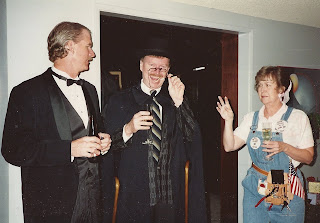This is, of course, big time "cognitive dissonance." I cannot make any rational sense out of a tale of miraculous rising from the dead. The universe as I apprehend it with my reason and five senses does NOT make exceptions to its own rules. I cannot, therefore, acknowledge miracles as real within the framework of what humans can explain.
But I also sense--who doesn't?--that the greatest portion of "reality" is probably completely inaccessible to human reason and could never be explained with human language.
 I'm fascinated by the distinction made by Karen Armstrong (in The Case for God) between logos and mythos. Armstrong asserts that these terms designate two different means of apprehending reality. Logos refers to knowledge we acquire using our five senses and our reason. This knowledge can be explained in human language and discussed logically. Mythos, on the other hand, refers to "unknowing," to a kind of intuitive, ineffable, inexplicable ecstasy that somehow involves us in transcendental reality--reality that goes beyond rational understanding. Further, Armstrong posits that logos and mythos are not incompatible but rather complementary ways of experiencing, simultaneously, both that which is and that which is not.
I'm fascinated by the distinction made by Karen Armstrong (in The Case for God) between logos and mythos. Armstrong asserts that these terms designate two different means of apprehending reality. Logos refers to knowledge we acquire using our five senses and our reason. This knowledge can be explained in human language and discussed logically. Mythos, on the other hand, refers to "unknowing," to a kind of intuitive, ineffable, inexplicable ecstasy that somehow involves us in transcendental reality--reality that goes beyond rational understanding. Further, Armstrong posits that logos and mythos are not incompatible but rather complementary ways of experiencing, simultaneously, both that which is and that which is not.In other words, Armstrong would assert that the Resurrection story is both false and true. It is false in a literal, rational sense: people die and they do not rise from the dead. Our senses do not provide us with ANY scientific, objective evidence that such miraculous events occur. But the Resurrection is true in a mythological and metaphorical sense. Our religious experience and practice make us aware of this truth, but there is simply no way that human language can explain what we sense as a result of our participation in the liturgy and discipline of the Easter faith. We cannot, in fact, really talk about the "mythological" truth. The language that we use--the language used in the Gospels--is metaphorical and completely unscientific. It "points" but what it points to is "silence." Armstrong calls this truth "apophatic" (wordless, irrational--or, perhaps "beyond meaning").
I suppose none of this "makes sense" to those who are accustomed to relying exclusively on logos (what can be known scientifically and rationally). But, as Armstrong points out, the "unknowing" of mythos--a transcendent state prized in all religions--is NOT the product of any INTELLECTUAL activity. Rather, it occurs only within and as a result of ritual practice, discipline and commitment to a way of living. One must empty oneself and indeed lose one's selfishness within this ritual structure. Armstrong insists--and I agree strongly--that the RITUAL life is what genuine religion is about.
The sacraments for Christians; the ritual prayer and fasts for Muslims; the "Path" for Buddhists. The "logical" explanations for all of this are, let's face it, nonsense. When I go to church (it still happens), I never listen to the sermons. What logical foolishness for a priest--or a religious establishment of any kind-- to attempt to "define" (limit) God or tell me anything at all about Him. God is not accessible to the logos. But in the ritual and the ceremony, in the songs and the chants, in the "magic" of the Mass, the mythos can (and, I think does) speak--with no words.
Does this mean that, in order to "go beyond," we must somehow abandon our reason and our intelligence--deny the truths that we know logically? Of course not. That is the asinine conclusion of the fundamentalists who assert, ludicrously and dangerously, that what we know with our senses and our reason (logos) is NOT true and contrariwise, that the mythos of the Bible or the Koran IS objectively and scientifically and rationally provable using the logos faculty. So, we wind up with the outrageous cognitive dissonance of such statements as: humans did NOT evolve from more primitive life forms; Moses DID part the Red Sea; Jesus WAS born from a virgin; God does NOT want women priests, etc., etc., etc.
And, of course, the biggie: Jesus DID really and truly and objectively and demonstrably rise from the dead.
Nope. Not scientific. My logos says NO. But my mythos says YES. And, for the time being at least, I'm going to try to be faithful to both forms of knowing. Therefore, perhaps it is best, at this juncture, to practice what most of the greatest religious leaders have urged their disciples to do when they, the disciples, reached the limits of their logical understanding: shut up!







.jpg)








